CALL TODAY 646-846-1136 | EMAIL
Surgical Experts Dedicated to Improving Lives
At Lenox Hill Minimally Invasive Surgery PLLC, Dr. Valery Dronsky and his staff of medical professionals provide compassionate care with the highest ethical & professional standards. In our state of the art facility, we offer surgical services using only the most cutting edge and current procedures and treatments. We specialize in general surgery, including extensive experience in performing hernia repair surgery. Our expertise is in minimally invasive surgery and robotic surgery. Minimally invasive and robotic surgery often allow patients to experience easier recovery than traditional open surgery. They also allow for more precise and less traumatic surgery. When robotic and minimally invasive surgery is not an option, we are also skilled and experienced in traditional open surgical procedures.
Dr. Dronsky is an experienced and highly skilled surgeon having undergone extensive training in school, residency and fellowships. He practices medicine with ethical behavior, compassion and superb bedside manner. In the operating room he exhibits precision mechanical abilities, analytical thinking and the ability to visualize tissue in three dimensions. These innate and learned skills allow Dr. Dronsky to be one of the most dexterous and skilled professionals in New York City and the Country.
Call us: 646-846-1136
PATIENT TESTIMONIALS
Recent Awards
We are honored and deeply appreciative to have consistently received prestigious awards and recognition year after year, establishing us as one of New York’s foremost hospitals for a wide range of general surgeries, safety measures, specialized procedures, and overall excellence in healthcare. At Lenox Hill Minimally Invasive Surgery, our unwavering commitment lies in delivering exceptional care and unwavering support to our patients, guaranteeing their safety and successful recovery throughout their entire surgical experience.
Hospital Quality Awards
 America’s 50 Best Hospitals Award™ (2023, 2022)
America’s 50 Best Hospitals Award™ (2023, 2022)
Top 1% in the nation for providing the highest clinical quality year over year.

America’s 100 Best Hospitals Award™ (2021)
Top 2% in the nation for consistently delivering clinical quality year over year.

America’s 250 Best Hospitals Award™ (2023, 2022, 2021)
Top 5% in the nation for consistently delivering clinical quality.

Patient Safety Excellence Award™ (2023, 2022)
Top in the nation for providing excellence in patient safety by preventing infections, medical errors, and other preventable complications.
Specialty Clinical Quality Awards

America’s 100 Best Hospitals for Cardiac Care Award™ (2023, 2022, 2021, 2020, 2019)
Superior clinical outcomes in heart bypass surgery, coronary interventional procedures, heart attack treatment, heart failure treatment, and heart valve surgery.

America’s 100 Best Hospitals for Coronary Intervention Award™ (2023, 2022, 2021, 2020, 2019)
Superior clinical outcomes in coronary intervention procedures (angioplasty with stent).

America’s 100 Best Hospitals for Prostate Surgery Award™ (2023, 2022, 2021)
Superior clinical outcomes in prostate removal surgery and transurethral resection of the prostate.
Click to see all of our Healthgrades best doctors awards





Visit our main website at www.LenoxHillMinimallyInvasiveSurgery.com
Blog Posts are Below:
Monthly Archives: August 2019
Pancreas Surgery – What to Expect
Pancreaticoduodenectomy – what a mouthful! This long word is the technical name for one of the most common pancreas surgery procedures. Also known as the Whipple procedure, this surgery involves removing a diseased section of the pancreas. But what even is the pancreas? Why do we need it? And what should you expect if you need this surgery?
What is the Pancreas?
Many people would likely have difficulty pointing up the location of the pancreas, let alone naming what it does. The pancreas can be found in the abdomen, just behind the stomach. It is a small organ, not more than a few inches long, but one of the most essential organs for daily life. The pancreas is responsible for the creation of specific chemicals that the body uses for digestion. These chemicals, also known as enzymes, are used to break down the food that we eat. without these enzymes, we would be unable to process the fat, proteins, and carbs within our food into energy.
At the same time, the pancreas also responsible for creating the two hormones that monitor and regulate blood sugar- insulin and glucagon. In cases where the pancreas is unable to produce the hormones and enzymes it should, serious and life-threatening side effects can develop.
Why Would you Need Pancreas Surgery?
When functioning properly, the pancreas is an essential organ for regulating energy levels and providing the body with the nutrients it requires. However, in some cases, the pancreas can pose a potential threat to the rest of the body. For example, in the case of pancreatitis, those enzymes used to digest food begin the process of digestion on the pancreas itself.
Other times, the pancreas can develop cancer. This can be a serious risk, as cancer can spread to other parts of the body. This makes the pancreas a risk to the other organs within the body.
What to Expect from Pancreas Surgery
During the procedure for pancreas surgery, you will be anaesthetized and the surgeons will do what they do best. Depending on your specific needs, they may remove certain sections of the pancreas and even surrounding tissue. Usually, the general needs can be identified long before the surgery starts. Some decisions need to be made while the surgery is happening. That is why you want to have the best surgeons you can find working with you!
Once the surgery has been completed, a short stay is to be expected. This gives us an excellent opportunity to closely monitor your recovery, vital signs, and medication use to ensure you are healing properly. Your stay will likely not be more than a few days, but full recovery from pancreas surgery can take up to a few months. While you recover, there are a few side effects and changes you can expect. The first and most common is operation site pain or discomfort. Digestive problems have also been noted. As the pancreas plays such a large part in digestion, it is only to be expected that the body will have to adjust to a new way of doing things. The most noteworthy aspect of this is the fact that you will not be able to eat for a few days after the surgery.
Any time there is a procedure near the abdomen, there is a potential for essential skills such as walking and sitting up to be impaired. It will be important to, in accordance with your specific instructions from your surgeon, stay active to the extent possible.
Are you in need of pancreas surgery? Call the best surgeons in NYC for a consultation today.
LENOX HILL MINIMALLY INVASIVE SURGERY
——————-
References
https://www.pancreaticcancer.org.uk/information-and-support/treatments-for-pancreatic-cancer/surgery-for-operable-pancreatic-cancer/types-of-surgery/
https://www.cancer.org/cancer/pancreatic-cancer/treating/surgery.html
http://columbiasurgery.org/pancreas/what-expect-after-operation
History of Hernia Repair
You may think that hernia repair surgery is a relatively recent concept. And why not? Many people may view hernias as minor, insignificant problems. However, hernias can develop into serious, potentially life-threatening issues if left on checked. For centuries, people have been aware of just how dangerous a hernia can really be. Since ancient times, surgeons have been doing the best they can to correct this comment issue. Today, we have advanced techniques that allow safe and effective treatment with minimal recovery time. That has not always been the case, as we will consider.
The First Hernia Surgery
Ancient records of hernia surgery can date all the way back to ancient Egypt. Of course, there was minimal understanding of many of the concepts required to effectively perform any kind of surgery. Don’t even still, ancient Egyptians were able to understand the very basic information about hernias. For example, Even back then they understood that hernias could present a significant risk. They also understood many of the symptoms and potential causes for them. Just think! Long before computers, x-rays, and precision tools designed with the specific intent of performing surgery people wear attempting to correct such a serious issue. How effective were they? As you might expect, they were nowhere near as effective then as we are today. Due to the lack of evaluative and diagnostic understanding, many surgeries were performed in a sort of “trial and error” method. This included removing large sections of intestinal tissue, massive bloodletting to reduce the size of the hernia, and removing surrounding tissues. Some of these showed minimal results at best, leading many to dismiss the thought of treating hernias.
Technological and Medical Advancements
As time went on, more and more discoveries about anatomy and microbiology were developed that benefited the progress of hernia treatment. For example, the development of anesthetics allowed for a significant reduction in pain and therefore a more tolerable surgical experience. A growing understanding of antiseptic and hygiene techniques allowed for a much higher rate of recovery and greatly lower the risk of infection after surgery. In addition, further anatomical discoveries were constantly being made. This led to a better understanding of what exactly makes up a hernia, allowing for more effective and focused treatments. By the early 19th century, hernia surgeries were still being attempted with little to no success. This was all soon to change.
Landmark Developments
Has further medical understanding was refined, more effective treatment for a number of conditions with found. One primary development was with the implementation of prosthetic instruments. Originally, metal mesh sheets were implanted into the herniated region in order to prevent further herniation or relapse. This technique continues to be used today. Regular improvement on the materials, design, and placement of these mesh sheets continues to be made to this day. Also essential to hernia repair has been the greater use of the appropriate surgical procedures. For example, better laparoscopic techniques for entering the affected region and more effective sutures have made for better recovery times and less risk of complication. It is to be expected that constant improvement and development will be made to the surgical procedures. Advanced techniques, such as using robotic arms or lasers for increased precession, are just around the corner. We can be sure, regardless of what comes next, that the already effective and safe surgery involved in hernia repair will only get better!
Are you in need of the most up-to-date an advanced hernia surgery available today? Talk to the best surgeons in NYC to get your surgery scheduled.
Lenox Hill Minimally Invasive Surgery, LLP
117 E 77th Street
Suite 1A
New York, NY 10075
—————
References
https://www.ncbi.nlm.nih.gov/pubmed/19140492
https://www.ncbi.nlm.nih.gov/pubmed/14586774
https://jamanetwork.com/journals/jamasurgery/article-abstract/212807















